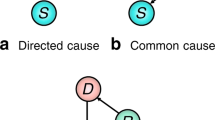Abstract
Although biomedical knowledge is believed to be of little value in diagnosis of routine clinical cases, studies of clinical reasoning have found that physicians revert to use of basic biomedical knowledge when faced with challenging clinical problems. The current paper presents two experiments that empirically examine the role of biomedical knowledge in diagnosis of difficult cases by novice diagnosticians. Novices are taught to diagnose a series of artificial diseases using either knowledge of causal mechanisms or a list of clinical features. In Experiment 1, participants are then tested on two types of clinical challenges: (1) case summaries with irrelevant findings; (2) cases using unfamiliar terminology. Participants with an understanding of underlying mechanisms out performed their counterparts on both types of cases. In Experiment 2, participants are tested 1 week after initial training. Participants with knowledge of causal mechanisms were found to do better on cases with unfamiliar terminology. The results of the two studies provide additional support for the critical role of biomedical knowledge in diagnosis of difficult clinical cases.
Similar content being viewed by others
References
Adelson, B. (1984). When novices surpass experts: The difficulty of a task may increase with expertise. Journal of Experimental Psychology: Applied, 18, 483–495.
Dore, K. L., Weaver, B., & Norman, G. R. (2003, November). What’s in a word: The impact specific words on diagnostic judgment. Poster session presented at 114th AAMC annual meeting, Washington, DC.
Eva, K. W., Brooks, L. R., & Norman, G. R. (2001). Does “Shortness of breath”=“dyspnea”? The biasing effect of feature instantiation in medical diagnosis. Academic Medicine, 76, S11–S13.
Eva, K. W., Norman, G. R., Neville, A. J., Wood, T. J., & Brooks, L. R. (2002). Expert–novice differences in memory: A reformulation. Teaching and Learning in Medicine, 14, 257–263.
Joseph, G. M., & Patel, V. L. (1990). Domain knowledge and hypothesis generation in diagnostic reasoning. Medical Decision Making, 10, 31–46.
Lesgold, A. M., Rubinson, H., Felovich, P. J., Glaser, R., Klopfer, D., & Wang, Y. (1988). Expertise a complex skill: Diagnosing X-ray pictures. In: M. T. H. Chi, R. Glaser, & M. Farr (Eds.), The nature of expertise (pp. 311–342). Hillsdale, NJ: Lawrence Erlbaum Associates.
Norman, G. R., Arfai, B., Gupta, A., Brooks, L. R., & Eva, K. W. (2003). The privileged status of prestigious terminology: Impact of “medicalese” on clinical judgments. Academic Medicine, 78, S82–S84.
Norman, G. R., & Brooks, L. R. (1997). The non-analytical basis of clinical reasoning. Advances in Health Sciences Education, 2, 173–184.
Norman, G. R., Trott, A. D., Brooks, L. R., & Smith, E. K. (1994). Cognitive differences in clinical reasoning related to postgraduate training. Teaching and Learning in Medicine, 6, 114–120.
Patel, V. L., Evans, D. A., & Groen, G. J. (1989). Reconciling basic science and clinical reasoning. Teaching and Learning in Medicine, 1, 116–121.
Patel, V. L., Evans, D. A., & Kaufman, D. R. (1990). Reasoning strategies and the use of biomedical knowledge by medical students. Medical Education, 24, 129–136.
Patel, V. L., Groen, G. J., & Arocha, J. F. (1990). Medical expertise as a function of task difficulty. Memory & Cognition, 18, 394–406.
Rikers, R., Winkel, W. T., Loyens, S., & Schmidt, H. (2003). Clinical case processing by medical experts and subexperts. Journal of Psychology, 137, 213–223.
Rikers, R. M., Loyens, S. M., & Schmidt, H. G. (2004). The role of encapsulated knowledge in clinical case representations of medical students and family doctors. Medical Education, 38, 1035–1043.
Schmidt, H. G., & Boshuizen, H. P. A. (1993). On the origin of intermediate effects in clinical case recall. Memory & Cognition, 21, 338–351.
Schmidt, H. G., Norman, G. R., & Boshuizen, H. P. (1990). A cognitive perspective on medical expertise: Theory and implication. Academic Medicine, 65, 611–621.
Author information
Authors and Affiliations
Corresponding author
Rights and permissions
About this article
Cite this article
Woods, N.N., Brooks, L.R. & Norman, G.R. The role of biomedical knowledge in diagnosis of difficult clinical cases. Adv in Health Sci Educ 12, 417–426 (2007). https://doi.org/10.1007/s10459-006-9054-y
Received:
Accepted:
Published:
Issue Date:
DOI: https://doi.org/10.1007/s10459-006-9054-y




